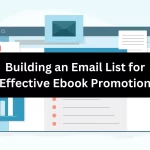Introduction
As an avid reader and self-published author, I understand the importance of getting your eBook discovered in this digital era. With countless books vying for attention online, implementing effective SEO strategies has become crucial. By optimizing your eBook’s visibility through targeted keywords, engaging content, and smart promotion tactics, you can significantly increase its chances of being found by potential readers. Allow me to share my personal experience and guide you through the process of boosting your eBook discoverability using proven SEO techniques.
Content
Optimizing Title, Meta Tags, and Descriptions

In my experience as a writer and digital marketer, I’ve discovered that crafting attention-grabbing titles is essential for capturing readers’ interest. When it comes to eBooks, the title plays a crucial role in attracting potential readers. By incorporating informative and keyword-rich phrases into your title, you can increase its visibility on search engines.
Meta tags and descriptions are equally important elements of SEO optimization. These short snippets provide a brief summary of what your eBook offers to readers. Optimizing these meta tags with relevant keywords not only helps search engines understand the content but also improves click-through rates (CTR). It’s like creating an enticing book cover that makes people want to open it!
To optimize your titles, meta tags, and descriptions effectively:
- Research Keywords: Identify popular keywords related to your eBook’s genre or topic using tools like Google Keyword Planner or SEMrush.
- Craft Engaging Titles: Create attention-grabbing titles that accurately represent the essence of your eBook while incorporating targeted keywords.
- Write Compelling Meta Descriptions: Craft concise yet compelling summaries that entice potential readers to click through and learn more about your eBook.
By following these tips and optimizing these elements strategically throughout your eBook promotion efforts, you’ll significantly enhance its discoverability among interested readers.
Leveraging Social Media Platforms

As an author who has successfully promoted my own eBooks through social media, I can attest to the power of utilizing these platforms to enhance discoverability. Social media offers a vast landscape for connecting with readers and driving organic reach.
To effectively leverage social media platforms for eBook promotion:
- Choose the Right Platforms: Identify which social media channels resonate most with your target audience. For example, if you’re targeting young adult readers, platforms like Instagram or TikTok may be ideal.
- Build an Engaged Community: Foster meaningful connections by engaging with your followers regularly. Respond to comments, ask questions, and share valuable content related to your eBook niche.
- Share Teasers and Excerpts: Create intrigue around your eBook by sharing snippets or teasers on social media platforms. This not only generates interest but also encourages potential readers to explore further.
- Collaborate with Influencers: Partnering with influencers in your genre can expand your reach significantly as they have established audiences that align with your target market.
- Run Contests or Giveaways: Encourage engagement and increase visibility by hosting contests or giveaways exclusively on social media platforms.
By implementing these strategies, I’ve witnessed firsthand how social media can become a powerful tool in boosting eBook discoverability organically.
Building genuine relationships within the online community is key—I’ve found that connecting authentically rather than solely focusing on self-promotion yields better results when it comes to leveraging social media for eBook success.
Mobile Optimization Considerations

As an author who has embraced mobile optimization for my eBooks, I’ve experienced firsthand the importance of reaching a wider audience base through mobile devices. In today’s digital landscape, where smartphones and tablets are ubiquitous, optimizing your eBook for mobile is essential.
To ensure a seamless user experience across different devices and maximize reach:
- Responsive Design: Employ responsive design techniques to create a website or landing page that automatically adjusts its layout based on the device being used.
- Fast Loading Speed: Optimize your eBook’s web pages by compressing images, minimizing code, and leveraging caching techniques to enhance loading speed.
- Easy Navigation: Simplify navigation menus and ensure intuitive browsing on smaller screens. Users should be able to find what they need effortlessly.
- Readable Typography: Choose legible fonts with appropriate sizes for comfortable reading on various screen sizes.
- Thumb-Friendly Interactions: Make buttons and interactive elements large enough so users can easily tap them without accidental clicks or frustration.
- Mobile-Friendly Content Formatting: Structure your content in short paragraphs with subheadings, bullet points, and visuals to improve readability on smaller screens.
By implementing these best practices in mobile optimization, you provide readers with a seamless experience regardless of their preferred device—enhancing engagement and expanding your potential audience.I’ve learned from personal experience that prioritizing mobile optimization not only improves user satisfaction but also boosts search engine rankings as Google values websites that cater well to mobile users.
Conclusion
In my journey as an author, I’ve discovered that implementing SEO strategies is vital for maximizing eBook discoverability. By conducting thorough keyword research, optimizing titles and meta tags, creating high-quality content, leveraging social media platforms, and considering mobile optimization, you can greatly enhance your chances of reaching a wider audience base.
How can I ensure my website is mobile-friendly for better eBook discoverability?
To make your website mobile-friendly, use responsive design techniques that adapt the layout and content based on the user’s device. Optimize loading speed, simplify navigation menus, choose readable fonts, and make interactive elements thumb-friendly.
Can I optimize eBooks published on platforms like Amazon or Apple Books?
While you may not have direct control over optimizing search engine visibility for eBooks on external platforms, you can still enhance their discoverability by optimizing metadata like titles, descriptions, and categories provided during publishing.
What role does page load speed play in eBook discoverability?
Page load speed is crucial as it impacts user experience and search engine rankings. Optimize images, minify code, leverage caching mechanisms, and choose a reliable web hosting provider to ensure fast-loading pages that attract more readers.
Are backlinks important for promoting eBooks through SEO strategies?
Backlinks play a vital role in establishing credibility and improving search engine rankings for your eBook’s landing page or website. Seek opportunities to build high-quality backlinks from reputable websites within your niche to drive organic traffic.
Should I focus on long-tail keywords or broader terms when optimizing my eBook’s content?
It’s advisable to strike a balance between long-tail keywords (specific phrases with lower competition) and broader terms (more generic but higher search volume). Incorporate relevant long-tail keywords naturally into your content while ensuring readability remains unaffected.

As an aspiring poet, Allen’s wordsmith skills shine through. He reviews and discusses poetry collections, celebrating the power of verse in our lives.












